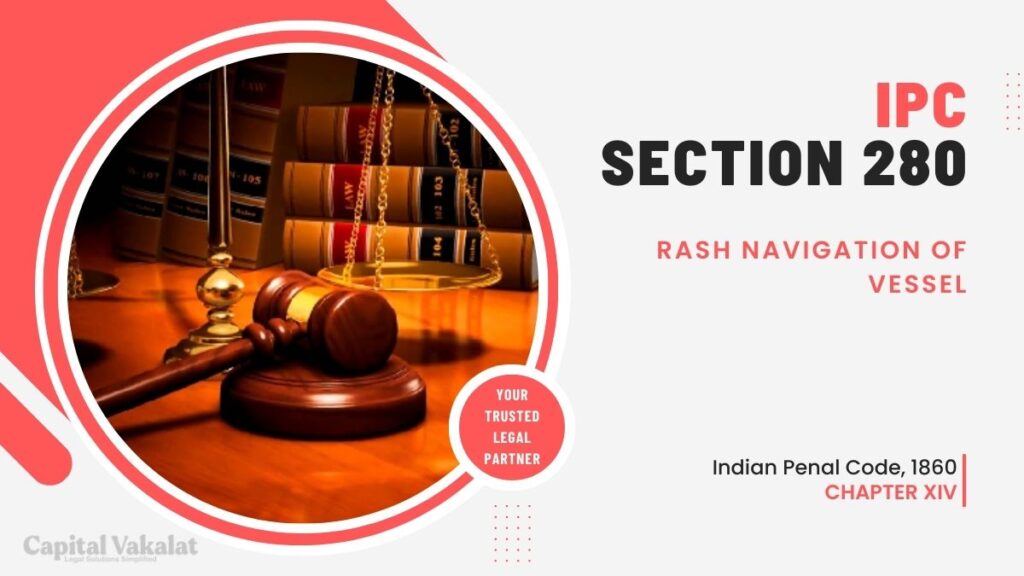Section 280 of the Indian Penal Code (IPC) deals with the offense of “Rash Navigation of a Vessel.” In recent years, maritime activities have witnessed significant growth, making it essential to understand the legal aspects of vessel navigation, especially concerning recklessness and negligence.

This article delves into the details of Section 280 IPC, exploring what constitutes rash navigation, the legal consequences, safety implications, and the global context.
Understanding Rash Navigation of Vessel
Rash navigation refers to the careless and reckless operation of a vessel, which endangers life, property, or the environment. It may involve high-speed maneuvering in crowded waterways, failure to follow navigation rules, or neglecting safety measures. Such actions can lead to collisions, groundings, oil spills, and other hazardous situations.
The Legal Perspective
To comprehensively understand Section 280 IPC, we must first look at the relevant Indian laws and sections that deal with maritime offenses.
- Section 280 IPC: This section specifically covers rash navigation of vessels and prescribes penalties for those found guilty.
- Merchant Shipping Act, 1958: This act lays down various regulations and safety requirements for vessels operating in Indian waters.
- Indian Ports Act, 1908: This legislation governs the management and operation of Indian ports, ensuring safety and security.
Consequences of Rash Navigation
Rash navigation poses several significant consequences, affecting various aspects of maritime activities:
Safety Risks: Reckless vessel operation can lead to accidents, injuries, and even loss of life. It endangers not only the crew on board but also other vessels and their passengers.
Environmental Impact: Collisions and groundings caused by rash navigation can result in oil spills, damaging marine ecosystems and causing long-term harm to the environment.
Cases and Precedents
Over the years, there have been several cases that have shed light on the implications of Section 280 IPC. Notable cases include those involving cruise ship accidents, oil tanker collisions, and fishing vessel mishaps. These cases serve as precedents and highlight the need for stringent enforcement of maritime regulations.
Challenges in Prosecution
Prosecuting cases under Section 280 IPC can be challenging. Gathering evidence, establishing negligence, and attributing responsibility can be complex, especially in the vast expanse of open waters. Additionally, proving reckless intent can be a legal hurdle.
Prevention and Safety Measures
Preventing rash navigation is of utmost importance. Vessel operators must adhere to safety protocols, including maintaining proper lookout, obeying speed limits, and respecting navigational rules. Employing technology like radar and GPS can significantly enhance safety.
Importance of Maritime Regulations
Stringent maritime regulations are crucial for the smooth and secure operation of vessels. Regulations help maintain order, reduce accidents, and protect the marine environment. Authorities and maritime organizations must regularly review and update these regulations to keep pace with evolving technologies and practices.
Global Context: Similar Laws
Many countries have laws similar to Section 280 IPC to address reckless navigation. For example, the United States has the Federal Boat Safety Act, while the United Kingdom follows the Merchant Shipping Act. These laws emphasize the importance of responsible vessel operation on a global scale.
Conclusion
Section 280 IPC plays a pivotal role in maintaining safety and order in maritime activities in India. Rash navigation of vessels can have far-reaching consequences, and it is the responsibility of vessel operators, maritime authorities, and society at large to ensure the strict enforcement of this law. By doing so, we can protect lives, property, and our precious marine environment.
Frequently Asked Questions
How can vessel operators prevent rash navigation?
Vessel operators can prevent rash navigation by following safety protocols, maintaining proper lookout, and obeying navigational rules.
Are there international agreements governing vessel navigation?
Yes, international agreements like SOLAS (Safety of Life at Sea) set standards for vessel safety and navigation.
What are the common safety measures employed on vessels to avoid collisions?
Common safety measures include radar, GPS, proper lighting, and adherence to speed limits.
How does rash navigation impact marine ecosystems?
Rash navigation can result in accidents like oil spills, which harm marine ecosystems by polluting the water and endangering wildlife.